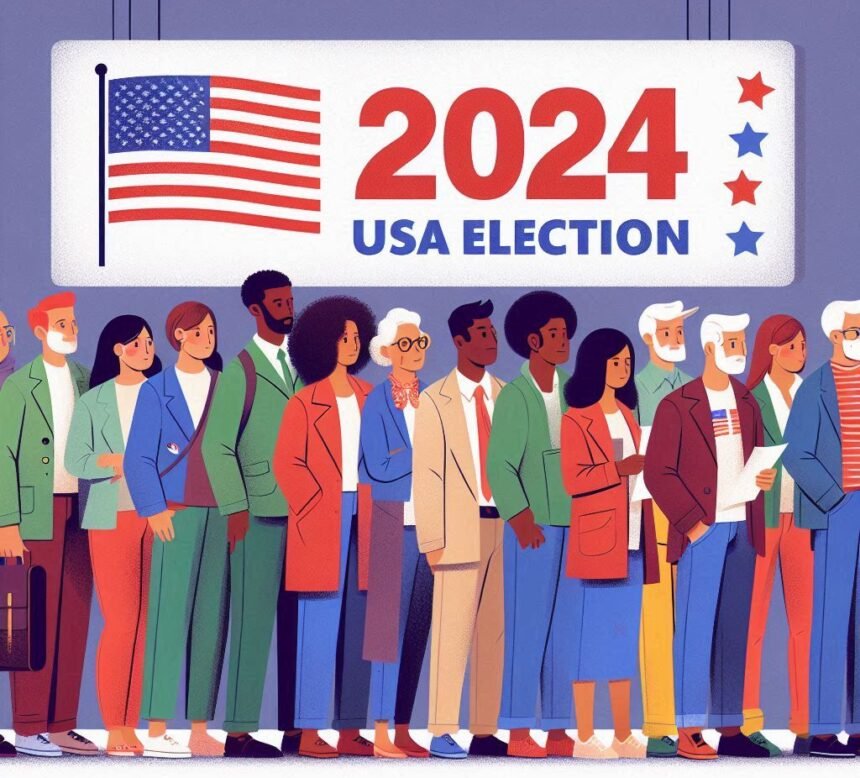The 2024 presidential election is approaching fast, and one critical demographic that both parties are focusing on is Hispanic voters. With the Hispanic population growing and diversifying, this group is playing an increasingly influential role in determining election outcomes. But where exactly do Hispanic voters stand in the 2024 presidential election, and what issues matter most to them?
In this blog, we’ll dive into the current landscape, the key factors influencing Hispanic community, their political preferences, and how candidates are shaping their campaigns to appeal to this crucial voting bloc.
The Growing Importance of Hispanic Voters
Hispanic community have become one of the most powerful voting groups in the United States. As of 2023, the Hispanic population has surpassed 62 million, making it the largest minority group in the country. More importantly, the number of eligible Hispanic voters has steadily increased, making their voice more significant in shaping policy and presidential outcomes.
Why Are They So Crucial in 2024?
Hispanic voters are strategically important in swing states, where elections are often decided by a narrow margin. States like Florida, Arizona, Nevada, and Texas, which boast large Hispanic populations, could see their outcomes swayed by this demographic. These voters are diverse not only in terms of ethnicity but also in terms of political ideology, economic status, and social concerns.
Additionally, Hispanic voters have a reputation for high voter turnout in key election cycles, as seen in 2020 when an estimated 16.6 million Hispanic Americans cast their ballots. With their growing influence, both the Democratic and Republican parties are focusing on capturing the support of Hispanic community in the 2024 election.

What Issues Matter Most to Hispanic Voters?
While Hispanic voters share some common concerns, they are not a monolithic group. The issues they care about vary based on geographic location, cultural background, and socioeconomic factors. However, several key issues consistently emerge as top priorities for Hispanic voters in the 2024 election.
1. Economic Stability and Job Growth
For Hispanic voters, the economy remains a top concern. A significant portion of this demographic is concentrated in industries like construction, hospitality, and agriculture, all of which were deeply affected by the COVID-19 pandemic. As a result, job recovery, wage growth, and access to quality employment are key factors influencing their vote in 2024.
Candidates who focus on creating jobs, raising the minimum wage, and ensuring equitable access to economic opportunities are likely to resonate with Hispanic voters. According to recent data, 80% of Hispanic voters list economic concerns as a major issue in the upcoming election.
2. Healthcare Access
Healthcare is another major issue for Hispanic voters. Many in the community lack access to affordable healthcare or are underinsured. Immigration status and language barriers often create additional challenges in navigating the healthcare system. The COVID-19 pandemic also disproportionately affected Hispanic communities, further emphasizing the need for accessible healthcare solutions.
In the 2024 election, candidates must address the healthcare disparities that Hispanic voters face, with a focus on expanding coverage, lowering prescription drug costs, and improving access to preventative care.
3. Immigration Policy
Immigration remains a polarizing issue within the Hispanic community. Many Hispanic voters are immigrants or have close ties to immigrant communities, so immigration policy directly impacts their lives. While some voters are passionate about comprehensive immigration reform, others may focus more on border security.
In 2024, candidates will need to walk a fine line between addressing the humanitarian concerns of immigration while ensuring national security. Policies around DACA (Deferred Action for Childhood Arrivals), pathways to citizenship, and border enforcement will be key topics for many Hispanic voters.
4. Education
Access to quality education is a critical issue for Hispanic voters, particularly for younger generations. Hispanic families place a high value on education, and issues such as student loan debt, college affordability, and equitable funding for public schools are of utmost importance.
Both Democrats and Republicans will need to address how they plan to support educational programs, improve funding for schools in Hispanic-majority areas, and make higher education more affordable to secure the Hispanic vote.
Political Alignment of Hispanic Voters
Are Hispanic Voters Loyal to One Party?
Traditionally, the Democratic Party has enjoyed strong support from Hispanic voters, but recent elections have shown that this loyalty is shifting. In the 2020 election, while President Joe Biden won the majority of the Hispanic vote, former President Donald Trump saw a notable increase in support from this group, particularly among younger male voters and those in states like Florida and Texas.
Hispanic Voters and the Democratic Party
The Democratic Party has historically been seen as the champion of issues that resonate with Hispanic community, such as immigration reform, healthcare access, and workers’ rights. However, some Hispanic voters have grown disillusioned with the party, feeling that it has not delivered on its promises, particularly in the areas of immigration and economic reform.

Hispanic Voters and the Republican Party
The Republican Party has made significant inroads with Hispanic community in recent years, especially those who align with conservative values such as family, religion, and small government. Many Hispanic voters, particularly those in Florida and Texas, have responded positively to the GOP’s stance on economic issues, entrepreneurship, and traditional family values.
In 2024, Republicans will continue to court Hispanic community by focusing on pro-business policies, border security, and religious freedom, which resonate with a growing number of conservative Hispanics.
Regional Breakdown of Hispanic Voters
Florida
Florida’s Hispanic population is diverse and politically influential. Cuban Americans, who make up a significant portion of the Hispanic electorate in the state, generally lean conservative and often support candidates with strong economic freedom platforms and tough stances on foreign policy, especially toward Latin American countries like Cuba and Venezuela. On the other hand, Puerto Ricans and other Latino groups in Florida tend to favor candidates who emphasize healthcare, community support, and immigration reform.
The Hispanic vote in cities like Miami, with its large Cuban-American community, and Orlando, home to many Puerto Ricans, is crucial in shaping the state’s election outcome. To win Florida, candidates must address economic recovery, healthcare access, and comprehensive immigration reform.
Texas
Texas is a key state where the Hispanic vote can make a decisive difference. The state’s large Hispanic population is spread across both urban and rural areas, with voters in cities like Houston, Dallas, and San Antonio generally leaning more progressive than those in rural regions. Hispanic voters in Texas are particularly concerned with issues like economic inequality, healthcare access, and public education.
Urban Hispanic voters tend to support policies that focus on raising wages, protecting workers’ rights, and ensuring affordable healthcare. Candidates who commit to addressing the challenges facing working-class families are likely to gain strong support in Texas’s major cities.
Arizona and Nevada
Hispanic voters in Phoenix, Arizona, and Las Vegas, Nevada, are poised to play a decisive role in the 2024 election. In 2020, Arizona’s Hispanic voters were pivotal in flipping the state, particularly in Maricopa County, where Phoenix is located. Their concerns center around healthcare, education, and immigration reform, making these issues key factors in winning their support in 2024.
In Nevada, the service-based economy in cities like Las Vegas is a major concern for Hispanic voters, many of whom work in hospitality and tourism. Policies that support workers’ rights, promote fair wages, and protect healthcare access will be essential for candidates hoping to win over Hispanic voters in Nevada.
Colorado
Colorado’s growing Hispanic population is becoming increasingly influential in state and national elections. In 2020, over 21% of Colorado’s electorate was Hispanic, and their votes heavily favored candidates who focused on expanding healthcare, affordable housing, and education.
In cities like Denver and Aurora, where a significant portion of the Hispanic population resides, voters are looking for candidates who prioritize policies that support working families, improve healthcare access, and invest in public education. Colorado’s young, progressive Hispanic voters are expected to play a major role in the 2024 election, making the state one to watch closely.
New York
New York, often considered a Democratic stronghold, has a sizable Hispanic population that plays a significant role in city and state elections. In New York City, Hispanic voters, particularly those of Puerto Rican, Dominican, and Mexican descent, prioritize issues like affordable housing, public education, healthcare access, and immigrant rights.
Candidates who address income inequality, affordable housing initiatives, and public healthcare programs will likely receive strong support from Hispanic voters in the city, particularly in boroughs like The Bronx and Queens, where the majority of the Hispanic population resides.
California
California has the largest Hispanic population in the United States, with cities like Los Angeles, San Diego, and San Jose home to millions of Hispanic voters. This city is often seen as reliably Democratic, but the state’s Hispanic community still play a crucial role in local and national elections.
Economic recovery, housing affordability, and immigration reform are top priorities for Hispanic voters in California. The housing crisis, particularly in large cities like Los Angeles, makes affordable housing one of the most critical issues. Additionally, many Hispanic families are concerned with healthcare access and ensuring protections for immigrant communities.
New Mexico
New Mexico, with one of the highest percentages of Hispanic voters in the country, is another state where their influence is undeniable. Cities like Albuquerque and Santa Fe are home to a large Hispanic population, many of whom are deeply invested in policies that protect healthcare access, support public education, and preserve cultural heritage.
Candidates seeking to win over Hispanic voters in New Mexico must address these issues, with a particular focus on economic policies that uplift rural and urban Hispanic communities alike.

The Role of Young Hispanic Voters
Young Hispanic voters are an emerging force in American politics. With over 3 million eligible voters between the ages of 18 and 24, this group could have a significant impact on the 2024 election. Young voters tend to be more progressive, with strong support for issues like climate change, social justice, and student debt relief.
Both parties must find ways to engage this younger demographic, as they are more likely to vote based on issues rather than party loyalty. Social media, grassroots organizing, and candidate relatability will play a critical role in attracting young Hispanic voters to the polls in 2024.
Conclusion
As we approach the 2024 presidential election, Hispanic voters are poised to play a decisive role. Their growing influence, diversity of opinions, and geographic concentration in swing states make them a crucial demographic for both parties. The key to winning over Hispanic voters in 2024 will be addressing their top concerns—economic stability, healthcare access, immigration reform, and education—while appealing to their values and aspirations.
Candidates who successfully connect with Hispanic voters on these issues are likely to gain the upper hand in critical battleground states. With both parties investing heavily in Hispanic outreach, the 2024 election may very well hinge on where Hispanic voters decide to cast their ballots.












